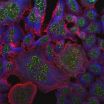Scientists pinpoint a new line of defence used by cancer cells
2014-12-08
(Press-News.org) Cancer Research UK scientists have discovered a new line of defence used by cancer cells to evade cell death, according to research published in Nature Communications* today (Monday).
The team identified a critical pathway of molecular signals which throw a lifeline to cancer cells, enabling them to survive even though they contain vast DNA errors which would usually trigger cell death.
The PKCƐ signal pathway**, which is used by cancer cells but rarely by normal cells, could be important in targeting some cancer cells as they rely on this pathway to survive.
The pathway helps the cancer cells survive by allowing them to untangle and separate their DNA. Cancer cells rely on this signal pathway more than normal cells because their DNA is more jumbled and prone to becoming tangled.
Turning off the pathway can trigger cancer cells to self-destruct because the machinery used to untangle the DNA fails, meaning it is torn apart as the cell divides - ravaging and causing huge breaks in the code which lead to the cancer cells' demise.
VIDEO:
A cell's ability to divide in two is fundamental to life.
These white blobs show DNA being separated as cells divide. But if mistakes are made, this can lead to...
Click here for more information.
Lead researcher Dr Nicola Brownlow, Cancer Research UK scientist at the Cancer Research UK London Research Institute, said: "Taking out this line of defence could be a powerful way to target the disease and re-programme cancer cells to self-destruct.
"The next step in our research is to understand which cancer types have this weak spot and to look for a marker that will allow us to test patients for cancers with this fault."
Nell Barrie, Cancer Research UK's senior science information manager, said: "This research has uncovered an important weakness which we could use to tackle cancer. Newer, precise methods which target the dents in cancer's armoury provide fresh opportunities for better treatments to help more people survive the disease.
"There's still a lot of work to do before this research leads to a new cancer treatment, but it offers us a new strategy to beat the disease by helping us to understand what causes and drives cancer."
INFORMATION:
For media enquiries contact Stephanie McClellan in the Cancer Research UK press office on 020 3469 5314 or, out of hours, on 07050 264 059.
Notes to editors:
* Brownlow et al. Mitotic catenation is monitored and resolved by a PKCε-regulated pathway. Nature Communications. DOI: 10.1038/ncomm6685.
** Also known as the Protein Kinase C epsilon (PKCƐ) pathway.
Images and video available:
You can download a video of the research here: http://bit.ly/1AmGw9H
Images are also available please contact the press office to request these.
About Cancer Research UK
Cancer Research UK is the world's leading cancer charity dedicated to saving lives through research.
Cancer Research UK's pioneering work into the prevention, diagnosis and treatment of cancer has helped save millions of lives.
Cancer Research UK receives no government funding for its life-saving research. Every step it makes towards beating cancer relies on every pound donated.
Cancer Research UK has been at the heart of the progress that has already seen survival rates in the UK double in the last forty years.
Today, 2 in 4 people survive cancer for at least 10 years. Cancer Research UK's ambition is to accelerate progress so that 3 in 4 people will survive cancer within the next 20 years.
Cancer Research UK supports research into all aspects of cancer through the work of over 4,000 scientists, doctors and nurses.
Together with its partners and supporters, Cancer Research UK's vision is to bring forward the day when all cancers are cured.
For further information about Cancer Research UK's work or to find out how to support the charity, please call 0300 123 1022 or visit http://www.cancerresearchuk.org. Follow us on Twitter and Facebook.
ELSE PRESS RELEASES FROM THIS DATE:
2014-12-08
UPTON, NY-A team of scientists from the U.S. Department of Energy's (DOE) Brookhaven National Laboratory, Columbia Engineering, Columbia Physics and Kyoto University has discovered an unusual form of electronic order in a new family of unconventional superconductors. The finding, described in the journal Nature Communications, establishes an unexpected connection between this new group of titanium-oxypnictide superconductors and the more familiar cuprates and iron-pnictides, providing scientists with a whole new family of materials from which they can gain deeper insights ...
2014-12-08
A new analysis has found that while clinical trial data support omitting radiation treatments in elderly women with early stage breast cancer, nearly two-thirds of these women continue to receive it. The findings are published early online in Cancer, a peer-reviewed journal of the American Cancer Society.
Results published in 2004 from a large, randomized clinical trial showed that adding radiation therapy to surgery plus tamoxifen does not reduce 5-year recurrence rates or prolong survival in elderly women with early stage tumors. Despite the findings, many doctors still ...
2014-12-08
DURHAM, N.C. - Women over the age of 70 who have certain early-stage breast cancers overwhelmingly receive radiation therapy despite published evidence that the treatment has limited benefit, researchers at Duke Medicine report.
The study suggests that doctors and patients may find it difficult to withhold treatment previously considered standard of care, even in the setting of high quality data demonstrating that the advantages are small.
"The onus is on physicians to critically analyze data to shape our treatment recommendations for patients, weighing the potential ...
2014-12-08
Dublin, IRELAND Monday December 8th, 2014 - Millions of documents stored in archives could provide scientists with the key to tracing agricultural development across the centuries, according to new research completed at Trinity College Dublin and the University of York.
Amazingly, thanks to increasingly progressive genetic sequencing techniques, the all-important historical tales these documents tell are no longer confined to their texts; now, vital information also comes from the DNA of the parchment on which they are written.
Researchers used these state-of-the-art ...
2014-12-08
Metabolic syndrome is linked with an increased frequency and severity of lower urinary tract symptoms, but weight loss surgery may lessen these symptoms. The findings, which come from two studies published in BJU International, indicate that urinary problems may be added to the list of issues that can improve with efforts that address altered metabolism.
Lower urinary tract symptoms related to urinary frequency and urgency, bladder leakage, the need to urinate at night, and incomplete bladder emptying are associated with obesity in both men and women. To see if these ...
2014-12-08
HANOVER, N.H. - December 8, 2014 - With health systems in the U.S., U.K., and around the world trying to increase vaccination levels, it is critical to understand how to address vaccine hesitancy and counter myths about vaccine safety. A new article in the journal "Vaccine" concludes, however, that correcting myths about vaccines may not be the most effective approach to promoting immunization among vaccine skeptics. The study, which was co-authored by Brendan Nyhan, an assistant professor of government at Dartmouth College, and Jason Reifler, a senior lecturer of politics ...
2014-12-08
SAN FRANCISCO - The latest results of clinical trials of more than 125 patients testing an investigational personalized cellular therapy known as CTL019 will be presented by a University of Pennsylvania research team at the 56th American Society of Hematology Annual Meeting and Exposition. Highlights of the new trial results will include a response rate of more than 90 percent among pediatric acute lymphoblastic leukemia patients, and results from the first lymphoma trials testing the approach, including a 100 percent response rate among follicular lymphoma patients and ...
2014-12-08
Although it is among the most highly metastatic of all cancers, multiple myeloma is driven to spread by only a subset of the myeloma cells within a patient's body, researchers at Dana-Farber Cancer Institute have found in a study presented at the annual meeting of the American Society of Hematology (ASH).
The study suggests that attacking those subsets with targeted drugs may degrade the disease's ability to spread throughout the bone marrow of affected patients, the authors say.
The discovery was made by developing a mouse model of the disease that enabled researchers ...
2014-12-08
An oral targeted drug has shown encouraging activity and tolerable side effects in patients with treatment-resistant or relapsed acute myelogenous leukemia (AML) - a poor-prognosis group with few options - report investigators from Dana-Farber Cancer Institute and M.D. Anderson Cancer Center.
Of 32 patients treated with the oral inhibitor ABT-199, five had eradication of their leukemia and several more had stable disease, according to Anthony Letai, MD, PhD, of Dana-Farber, senior author of the report.
The phase 2 multicenter trial was the first ...
2014-12-08
A phase two study that investigated the potential of the drugs azacitidine (AZA) and lenalidomide (LEN), demonstrated that the two therapies in combination may be an effective frontline treatment regimen for patients with higher-risk forms of myelodysplastic syndrome and acute myeloid leukemia.
Myelodysplastic syndrome (MDS) is a type of cancer in which the bone marrow does not make enough healthy blood cells, resulting in abnormal (blast) cells in the blood and/or bone marrow. Higher-risk patients experience an unusually large percentage of blasts in their blood. Patients ...
LAST 30 PRESS RELEASES:
[Press-News.org] Scientists pinpoint a new line of defence used by cancer cells





